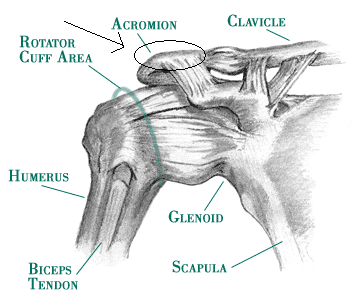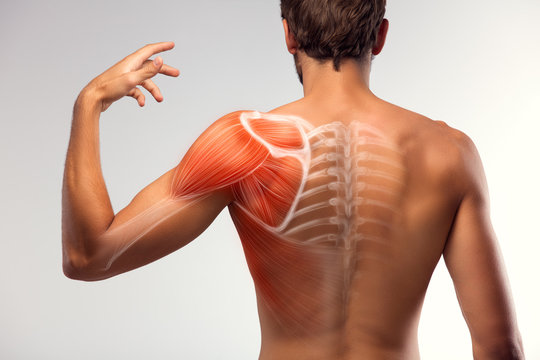Shoulder Joint: Basic Anatomy and Functions
The shoulder joint is the largest joint of the upper extremities, which facilitates all your arm movements. The following musculoskeletal components comprise your shoulder joint.

- Bones: Humerus (upper arm bone), clavicle (collar bone), and scapula (shoulder blade) are the three bones that form the shoulder joint skeleton. The humerus has a ball-like head that fits into a cavity of the shoulder blade to form the majority of the joint. A smaller joint formed by the scapula and clavicle also forms part of the shoulder joint.
- Muscles: Four supporting muscles of the shoulder joint are the infraspinatus, supraspinatus, subscapularis, and teres minor. The muscles, along with their tendons, curve around the shoulder joint to form an anatomical supporting structure known as the ‘rotator cuff’.
Bones, muscles, and tendons provide mechanical support and tensile strength to the shoulder joint. Numerous blood vessels and nerves, woven in and around the shoulder joint, also have a significant role to play in the latter’s functions.
Common Causes Of Shoulder Pain
Knowing the basic shoulder anatomy enables us to understand the factors around us that can cause and exacerbate shoulder joint troubles. Here are some of the common causes of shoulder pain.

- Arthritis: Shoulder joint arthritis is a result of inflammation and degeneration inside the joint. According to almost every shoulder surgeon in Mumbai, internal swelling of the tissue can cause considerable shoulder pain.
- Injury: You can injure your shoulder joint due to a fall, in a road accident, or due to direct impact with a heavy object. The resultant pain could be due to dislocation, fracture, or rupture of the bones, muscles, or tendons of the shoulder joint.
- Increased Wear And Tear: Overuse of the shoulder joint without giving it adequate rest may increase the wear and tear within the joint. The cartilage within the joint may gradually degenerate over the years and cause chronic shoulder pain.
An orthopedic surgeon in Mumbai is also likely to see patients with a frozen shoulder, shoulder bursitis, or calcium deficiency complaining of shoulder pain.
Treating Shoulder Pain
The cause and symptoms of shoulder pain are the deciding factors for its course of treatment. Depending on the patient’s health history and physical evaluation, the following treatment options may suit them.

- Medication: Shoulder pain that is not very severe in frequency or intensity may be treated with oral or injectable medication. Pain relief medicines, anti-inflammatory agents, steroids, and nutritional supplements are the choice of drugs to treat mild to moderate shoulder pain. The medicines are likely to repair internal joint tissue damage.
- Surgery: Surgery is the next choice of treatment when shoulder pain does not respond to medicines or when there is irreversible internal damage. Debridement surgery may be used to remove the damaged tissue from within to stimulate natural healing. A joint replacement surgeon in Mumbai may be consulted for the treatment of advanced shoulder joint damage.
Expert Advice on Managing Shoulder Joint Pain from Dr. Amyn Rajani
Shoulder joint pain can be caused by various factors including injury, arthritis, rotator cuff tear, bursitis, tendinitis, and frozen shoulder. It is important to consult a doctor for proper diagnosis and treatment. Treatment options can range from physical therapy, pain management, cortisone injections, to surgery in severe cases.
It is important to seek medical attention in a timely manner to address any potential underlying issues and prevent further discomfort or injury. If you are experiencing shoulder joint pain, it is recommended that you see an orthopedic doctor, like Dr. Amyn Rajani in Mumbai, for an accurate diagnosis and appropriate treatment plan. Book an Appointment at 91-88989 75355, 91-22-23619137.



